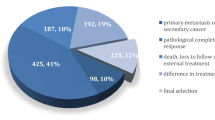Abstract
E-cadherin, a transmembrane cell adhesion molecule, has been observed to have an altered pattern of immunoreactivity in several types of carcinomas. In lobular breast cancer, loss of immunoreactivity has been shown to be due either to out-of-frame deletions or to nonsense mutations of the E-cadherin gene. We analysed 29 cases of completely resected colon carcinoma with immunohistochemistry using the HEC-D1 antibody. Normal protein expression similar to that in the adjacent nonmalignant mucosa was seen in 6 cases, whereas 23 tumours had reduced or absent E-cadherin expression. In the 8 cases with no expression of E-cadherin revealed by immunohistochemistry, the entire E-cadherin cDNA sequence was analysed. In these cases, sequence analysis failed to reveal any cDNA mutations despite the negative immunohistochemistry. Possible explanations for this discrepancy include regulatory defects in the E-cadherin promoter, abnormalities at the translation or protein processing levels and mutations in other parts of the gene that were not investigated by the cDNA analysis (e.g. intronic sequences), which could play a role in causing abnormal processing of the E-cadherin protein.
Similar content being viewed by others
Author information
Authors and Affiliations
Additional information
Received: 14 September 1998 / Accepted: 23 February 1999
Rights and permissions
About this article
Cite this article
Schuhmacher, C., Becker, I., Oswald, S. et al. Loss of immunohistochemical E-cadherin expression in colon cancer is not due to structural gene alterations. Virchows Archiv 434, 489–495 (1999). https://doi.org/10.1007/s004280050373
Issue Date:
DOI: https://doi.org/10.1007/s004280050373




